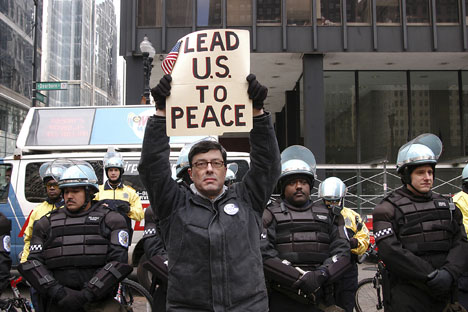Avid anti-war activist lights himself on fire, dies in protest

Malachi Ritscher holds up a sign during an antiwar protest in Chicago in this photo from April 2003. On Nov. 3, 2006, Ritscher set up a video camera, doused himself with gasoline and lit himself on fire on expressway off-ramp in downtown Chicago. War prot AP Photo/Joeff Davis
Nov 27, 2006
Last updated on May 12, 2016 at 06:30 a.m.
CHICAGO – Malachi Ritscher envisioned his death as one full of purpose.
He carefully planned the details, mailed a copy of his apartment key to a friend, created to-do lists for his family. On his Web site, the 52-year-old experimental musician who’d fought with depression even penned his obituary.
At 6:30 a.m. on Nov. 3 – four days before an election caused a seismic shift in Washington politics – Ritscher, a frequent anti-war protester, stood by an off-ramp in downtown Chicago near a statue of a giant flame, set up a video camera, doused himself with gasoline and lit himself on fire.
Aglow for the crush of morning commuters, his flaming body was supposed to be a call to the nation, a symbol of his rage and discontent with the U.S. war in Iraq.
Get The Daily Illini in your inbox!
“Here is the statement I want to make: if I am required to pay for your barbaric war, I choose not to live in your world. I refuse to finance the mass murder of innocent civilians, who did nothing to threaten our country,” he wrote in his suicide note. “… If one death can atone for anything, in any small way, to say to the world: I apologize for what we have done to you, I am ashamed for the mayhem and turmoil caused by my country.”
There was only one problem: No one was listening.
It took five days for the Cook County medical examiner to identify the charred-beyond-recognition corpse. Meanwhile, Ritscher’s suicide went largely unnoticed. It wasn’t until a reporter for an alternative weekly, the Chicago Reader, pieced the facts together that word began to spread.
Soon, tributes – and questions – poured in to the paper’s blogs.
Was this a man consumed by mental illness? Or was Ritscher a martyr driven by rage over what he saw as an unjust war? Was he a convenient symbol for an anti-war movement or was there more to his message?
“This man killed himself in such a painful way, specifically to get our attention on these things,” said Jennifer Diaz, a 28-year-old graduate student who never met him but has been researching his life. Now, she is organizing protests and vigils in his name. “I’m not going to sit by and I can’t sit by and let this go unheard.”
Mental health experts say virtually no suicides occur without some kind of a diagnosable mental illness. But Ritscher’s family disagrees about whether he had severe mental problems.
In a statement, Ritscher’s parents and siblings called him an intellectually gifted man who suffered from bouts of depression. They stopped short of saying he’d ever received a clinical diagnosis of mental illness.
“He believed in his actions, however extreme they were,” his younger brother, Paul Ritscher, wrote online. “He believed they could help to open eyes, ears and hearts and to show everyone that a single man’s actions, by taking such extreme personal responsibility, can perhaps affect change in the world.”
His son, who shares the same name as his father, said his father was trying to cope with mental illness. Suicide seemed to be the next step, and the war was a way to give his death meaning.





